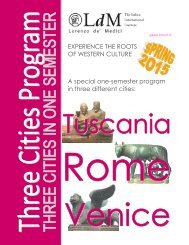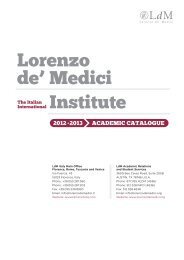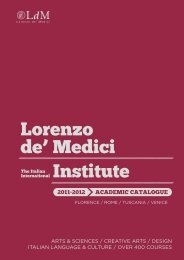aCademiC Catalog 2013-2014 - Lorenzo de Medici
aCademiC Catalog 2013-2014 - Lorenzo de Medici
aCademiC Catalog 2013-2014 - Lorenzo de Medici
Create successful ePaper yourself
Turn your PDF publications into a flip-book with our unique Google optimized e-Paper software.
Natural Resources Management in Italian<br />
Society<br />
ENV 220 R<br />
Cr: 3; Contact hrs: 45<br />
The course aims to study the origin of the earth’s main energetic<br />
natural resources, and the way they have been managed<br />
throughout the centuries up to mo<strong>de</strong>rn days. Each natural<br />
resource covered will be introduced by a <strong>de</strong>tailed scientific<br />
overview. This will be followed by an examination of the<br />
evolution of the resource’s management by humankind through<br />
a historical and geographical analysis. Practical examples will be<br />
explained, especially in regard to the current Italian situation as<br />
well as with a glance back at the fundamental episo<strong>de</strong>s which<br />
have tied the energy sources’ study with human evolution.<br />
During class times, discussions about the environmental impact<br />
of natural resource <strong>de</strong>velopment and management will be held.<br />
Environmental Ecology<br />
ENV 240 R<br />
Cr: 3; Contact hrs: 45<br />
This course explores the impact that human activities have on<br />
the environment. The basic concepts of ecology will be covered<br />
as well as the theoretical tools necessary for the un<strong>de</strong>rstanding<br />
of causes and effects of the alteration of the balance of an<br />
ecological system. The following major issues will be studied<br />
and analyzed with particular emphasis on current events:<br />
atmospheric and ground pollution; alteration of ecosystems;<br />
energy consumption and <strong>de</strong>velopment of alternative energy<br />
sources; and food resources.<br />
History<br />
Western Civilization<br />
HIS 130 R<br />
Cr: 3; Contact hrs: 45<br />
Survey of cultural, social and political <strong>de</strong>velopments in the<br />
western tradition between its origins in the Ancient Near East<br />
and the present. Themes inclu<strong>de</strong>: the Ju<strong>de</strong>o-Christian and Greco-<br />
Roman heritages, medieval to mo<strong>de</strong>rn Europe, nationalism,<br />
industrialization, western imperialism, totalitarianism and<br />
two World Wars, challenges of the later 20th and early 21st<br />
centuries.<br />
the range of primary sources available for ancient history;<br />
the political organization of the Roman state; the territorial<br />
expansion and its influence on the cultural and administrative<br />
sphere; Roman religion and the spread of Christianity; the<br />
Roman frontiers and the barbarian populations; and the end<br />
of the Roman world and the birth of a new society. In or<strong>de</strong>r<br />
to stimulate stu<strong>de</strong>nts’ critical skills in observing historical<br />
phenomena, a problem-oriented approach will be supported<br />
by readings of primary sources. Stu<strong>de</strong>nts will also have the<br />
chance to observe different approaches to un<strong>de</strong>rstanding<br />
the past and will <strong>de</strong>velop a sense of the role of historians and<br />
history in society.<br />
Roman Civilization through Its Monuments<br />
HIS 207 R<br />
Cr: 3; Contact hrs: 45<br />
This course investigates the history of ancient Rome primarily<br />
through its monuments — its architecture and urban form. We<br />
will consi<strong>de</strong>r the mythology of Rome as caput mundi (“the head<br />
of the world”), as well as the physical city and its infrastructures<br />
in antiquity, from the 8th century BCE to the 5th century CE.<br />
Significant architectural examples and monuments will be<br />
studied in their original historical, social and cultural context.<br />
The ways in which power was expressed symbolically through<br />
building projects and artwork will be addressed during classes,<br />
which will be held mostly on site in the city and its environs.<br />
Key archaeological sites and museums in and around the city<br />
of Rome will also form part of the program.<br />
History of Rome through the Cinema<br />
HIS 255 R; Dual listed: MCT 250 R<br />
Cr: 3; Contact hrs: 45<br />
The extraordinary history of the city of Rome has always been<br />
enmeshed with tragedy, drama and legend. In this course<br />
stu<strong>de</strong>nts analyze major events and <strong>de</strong>velopments in Roman<br />
history as <strong>de</strong>picted in famous movies, with a particular focus on<br />
the history of Rome from the 1920s to the 1970s. The films will<br />
also be explored in or<strong>de</strong>r to provi<strong>de</strong> stu<strong>de</strong>nts with an insight into<br />
techniques for writing a short but vivid cinematographic script.<br />
In the second part of the course, stu<strong>de</strong>nts will additionally have<br />
the opportunity to create their own Roman movie script using<br />
not only the information and professional tools studied in class<br />
but also their personal experiences ma<strong>de</strong> during their day by<br />
day life in Rome.<br />
School of Arts & Sciences ROME<br />
European History I: Antiquity to French<br />
Revolution<br />
HIS 150 R<br />
Cr: 3; Contact hrs: 45<br />
The course will explore the vast physical, social, political and<br />
mental changes that occurred in European societies from the<br />
rise of Mediterranean civilization until the French Revolution.<br />
This long-term perspective will help stu<strong>de</strong>nts to un<strong>de</strong>rstand<br />
the turning points in European history and the historical roots<br />
of contemporary European states. Particular attention will be<br />
<strong>de</strong>voted to the influence of Roman civilization on subsequent<br />
European empires and states. The evolution of Europe’s external<br />
relations will be another key topic of the course. The imperial<br />
expansion of Rome, the barbaric invasions, the Crusa<strong>de</strong>s and<br />
finally the new forms of European colonialism will be analyzed<br />
and explained. The third main theme of the course will be the<br />
process of nation building in mo<strong>de</strong>rn Europe, the rationale<br />
for the rise of nations and empires and the dynamics of the<br />
new system of states and international relations that appeared<br />
with the so-called Ancien Régime. This part of the course will<br />
provi<strong>de</strong> stu<strong>de</strong>nts with a very important tool for un<strong>de</strong>rstanding<br />
contemporary Europe and elements of historical methodology<br />
as well as elements of political theory which will be useful for<br />
other courses on European history and politics.<br />
Ancient Rome<br />
HIS 200 R; Dual listed: CLA 210 R<br />
Cr: 3; Contact hrs: 45<br />
This course offers a comprehensive introduction to the history<br />
and growth of the ancient Roman empire from the early<br />
settlements in Latium, through the republican and imperial<br />
periods, to the formation of a new Roman world after the crisis<br />
of the 3rd century. A series of themes and issues will be explored:<br />
Mo<strong>de</strong>rn Italy<br />
HIS 296 R; Dual listed: POL 296 R<br />
Cr: 3; Contact hrs: 45<br />
The main goal of the course is for stu<strong>de</strong>nts to gain a general<br />
un<strong>de</strong>rstanding of the way Italian history and culture has<br />
<strong>de</strong>veloped in the last 50 years, especially in the arena of<br />
public policies and social interactions. The course will be<br />
loosely divi<strong>de</strong>d in three main segments. The first one, relying<br />
mainly on historical data and information, aims to provi<strong>de</strong> a<br />
general background about Italian politics and culture. In the<br />
second part, we will focus on the current changes that have<br />
occurred in Italy during the past 20 years, focusing especially<br />
on the breakdown of the traditional political system and on the<br />
<strong>de</strong>creased relevance of the Church in State and public matters.<br />
Finally, we will examine how the last 10 years – during which<br />
there has been a great transformation in the way media affects<br />
the distribution and spread of information – have brought an<br />
apparent, but possibly not real, upheaval in the way politics,<br />
culture and information are received and <strong>de</strong>bated among<br />
Italians.<br />
Prerequisites: an introductory course in History or Political<br />
Science<br />
Italian Renaissance Civilization and Culture<br />
HIS 300 R<br />
Cr: 3; Contact hrs: 45<br />
This course explores the historical, literary and cultural<br />
<strong>de</strong>velopments of one of the most remarkable and vibrant<br />
periods of Italian history: the Renaissance. Stu<strong>de</strong>nts will<br />
be introduced to the main historical <strong>de</strong>velopments of the<br />
Renaissance period from the late fourteenth century to the end<br />
of the sixteenth century. The Renaissance is above all the age<br />
of the individual and the affirmation of his/her achievements,<br />
LdM Aca<strong>de</strong>mic <strong>Catalog</strong> <strong>2013</strong>-<strong>2014</strong><br />
137





